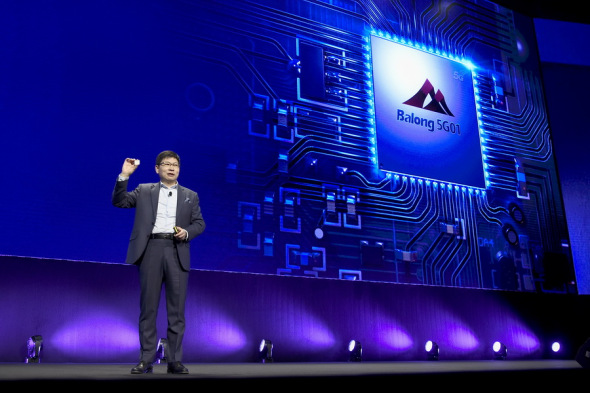
Huawei CEO Richard Yu presents the new Huawei Balong 5G01, a 5G commercial chipset, on Sunday in Barcelona, on the eve of the inauguration of the Mobile World Congress. (Photo/China Daily)
Huawei Technologies Co Ltd has unveiled its first 5G chipset compatible with global telecom standards, as the Chinese technology giant accelerates steps to commercialize the next generation of mobile communication technology.
The move is Huawei's latest effort to take on global chip giants Qualcomm Inc and Intel Corp, which are also scrambling to enable the application of 5G in consumer electronic devices.
Known as Balong 5G01, Huawei claimed that the chip was the world's first commercial chipset to meet 5G standards. It can deliver an internet speed of up to 2.3 gigabits per second, far faster than the speeds currently reached on 4G networks. However, it remains considerably slower than the industry promises of 20 gigabits per second when 5G matures.
The superfast technology is still in its infancy, as the 3rd Generation Partnership Project, or 3GPP, a body that governs global cellular standards, only agreed late last year on the technical specifications of how 5G should work.
Yu Chengdong, CEO of Huawei's consumer business group, said the company aims to launch a 5G phone powered by the new chipset in the third or fourth quarter of this year.
The new chipset puts Huawei in the same league as Qualcomm, which has unveiled its own modem, known as the X50. The US semiconductor giant is partnering with a string of smartphone vendors, most of which are Huawei's rivals, to work on 5G handsets.
Xiang Ligang, a telecom veteran and CEO of the industry website Cctime, said having in-house 5G chips highlights Huawei's technological strength and will reduce its reliance on foreign suppliers.
"It makes Huawei a strong player to offer an end-to-end 5G solution through its network, devices, and chipset-level capabilities," Xiang said.
The new chip is part of Huawei's broad efforts to gain a lead in the global 5G race. The technology is expected to allow consumers to download an 8-gigabit movie in seconds and help to make autonomous driving a reality, causing ripples across most industries and sectors in a new internet revolution.
According to the Shenzhen-based company, it has invested around $600 million in 5G research and development since 2009.


















































